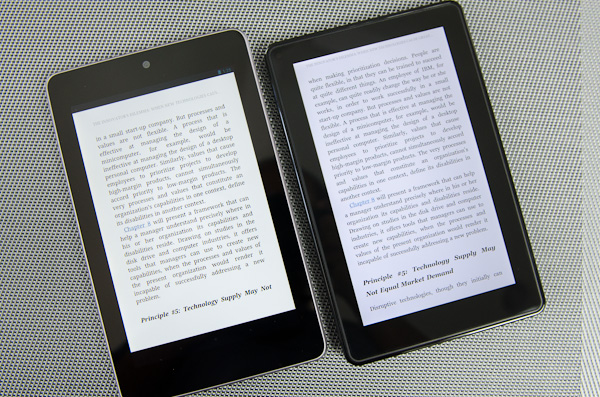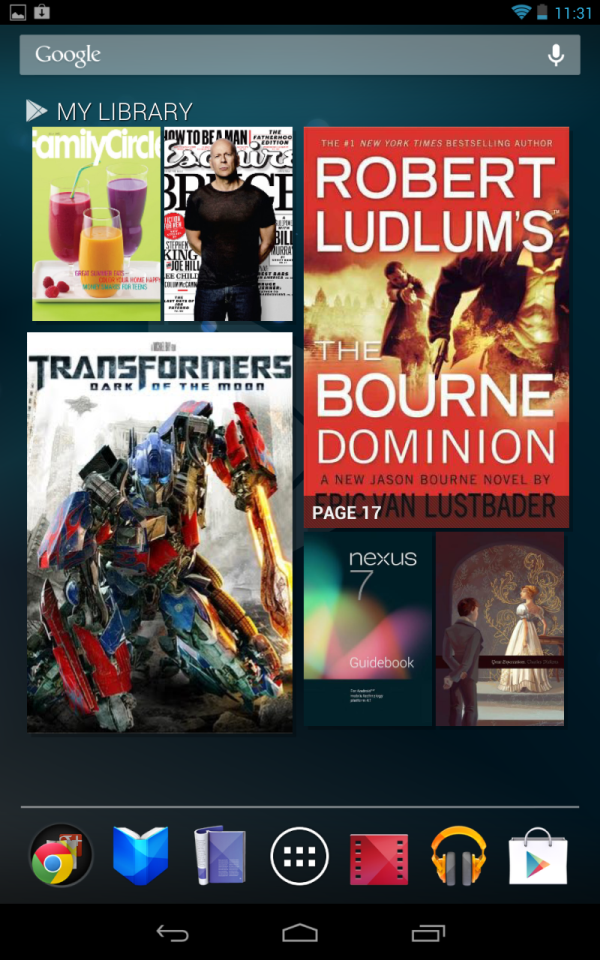The Google Nexus 7 Review
by Anand Lal Shimpi & Brian Klug on July 26, 2012 11:35 AM ESTAndroid 4.1
In the process of working on the Nexus 7 review I dusted off (literally) my Kindle Fire, powered it up and checked for updates expecting to find tons. I found none. The Kindle Fire is still running 6.3.1, released a few months ago, and more importantly it's still relying on the CPU for a lot of drawing, which means the UI isn't smooth. Scrolling in Amazon's Silk Browser is fast, but only because the Kindle Fire drops a lot of animation frames. The experience is jarring, and much better on the Nexus 7 by comparison.
While the Kindle Fire's OS looks like a polished, previous generation of Android, Android 4.1 delivers much of the smoothness of the iPad's iOS. Don't get me wrong, there are still some rough edges and hiccups. Project butter or not, Android 4.1's UI performance is still not perfect, but it's nearly so, and it's miles better than the Kindle Fire.

Nexus 7 running Kindle for Android (left) vs. Kindle Fire (right)
The Kindle Fire's carousel of previously used apps and media is smooth, but browsing the web on it is a mess compared to the Nexus 7. What's even more embarrassing for the Fire is even the Kindle app on the Nexus 7 delivers a smoother experience. Couple that with a warmer display and you actually have a better Kindle in the Nexus 7 than with Amazon's own device. When the Kindle Fire was released, its imperfections were easily overlooked since the Fire was so much better than any prior $199 tablets. The Nexus 7 dramatically raised the bar in the experience department.
Even compared to the Transformer Pad Infinity, the Nexus 7 feels faster thanks to UI speed improvements in Jelly Bean. The entire OS feels snappier, despite running on technically slower hardware.
What sets a tablet apart from a smartphone isn't just physical size, but also applications that take advantage of the size/resolution. Google attempts to deliver this with giant widgets that serve as portals to your content. The My Library widget automatically populates itself with books, magazines and movies you've purchased from the Google Play store. The result is quite impressive:
Start adding more conventional shortcuts to your home screen and the illusion quickly collapses, but I do believe the well laid out main home screen is what Google originally intended with widgets on Android.
As an eReader I'd argue the Nexus 7 is at least as good as the Kindle Fire. You can debate the pros/cons of books from Google Play vs. Amazon's Kindle store, but the fact is that both are available on the Nexus 7. The Kindle app for Android works well (as I've already mentioned), although for actual shopping you'll have to use Amazon's website. A small price to pay for a much better tablet experience everywhere else.
In all honesty, that's what you really give up when picking the Nexus 7 over the Kindle Fire - you lose the tightly integrated Amazon shopping experience. You also lose Amazon's video streaming service, which presently doesn't have an Android client.











118 Comments
View All Comments
Sined - Thursday, July 26, 2012 - link
Hey Anand, great review as usual.I want to point out something about the lack of an SDcard slot.
Dan Morrill from Google Android team explained on Reddit why Google is moving away from SDCard storage on Nexus Devices.
It's a really interesting read on the reasons why.
http://www.androidpolice.com/2011/11/18/impromptu-...
Lucian Armasu - Thursday, July 26, 2012 - link
You keep putting Windows RT together with Windows 8, as if they are the same thing and will be just as successful (or will fail just as much). But in what way is a Windows RT tablet, especially one that is twice as expensive, or at least as expensive as an iPad, better than an Android tablet? Is there an advantage at all that they hold over Android tablets? Because I see none, and I'm not sure why you keep up-playing Windows RT while downplaying Android tablet throughout your article.antef - Thursday, July 26, 2012 - link
Agreed....a hybrid x86 Win8 device might appeal to some people, but a WinRT ARM tablet is not inherently better than Android. I would actually argue Android is better because its app ecosystem is more mature and all the Google services apps are a given. Metro is completely unproven.WinRT will have the limited desktop with a simplified set of Office apps, that's it. I don't care about that at all, along with many other people I'm sure.
Impulses - Friday, July 27, 2012 - link
Office RT is the only clear advantage out of the gate, if they actually provide a featured desktop conversion that just happens to run on ARM... If all they put out is a Metro stepchild then that goes out the window. (no pun intended) It's a big selling point tho, but only if Win RT tablets are price competitive with iPads and Android tablets.Personally I'm still not sold on this holy grail of device convergence either way. 12" or smaller laptops are too cramped for serious work, and tablets just aren't as comfortable for use around the house at that size either. 7" or 8.9" is ideal IMO, specially as an addition to a 13"-14" laptop which is probably the most common scenario.
I say that despite having enjoyed using a 10" ASUS Transformer for over a year now. Currently I have that and a 3 year old netbook and I'm really yearning for a larger laptop replacement for the latter and a smaller tablet in the long run (the TF + dock has been a nice replacement for the netbook when traveling without work duties tho).
EnzoFX - Thursday, July 26, 2012 - link
Why will Win8 Tablets cannibalize Android tablets?I'm all for more competition, and MS is definitely bringing it, but are you implying it'll overtake Android right away? MS has a long way to go before that. Even their specs seems underpar, except for the intel powered one, which comes in at ultrabook pricing...
Impulses - Friday, July 27, 2012 - link
If that... I seriously don't see how Intel powered tablet hybrids will come in at ultrabook pricing all the while sporting better displays and near identical hardware all around (with a more complex builds). Something's gotta give, or the build quality of ultrabooks has inflated prices a ton...TareX - Friday, August 3, 2012 - link
Windows 8 RT is DOA. No apps, no way to compete, and it's too late in the game to start a new third party base. Windows 8 pro tablets are GREAT, except that they won't be price anywhere close to being competitive, so those are kind of DOA too in a different way. Very few people would pay $800-1000 for a tablet.Death666Angel - Thursday, July 26, 2012 - link
Thanks for the video review, I started missing them already! :DIf the Nexus had an SD slot and more storage out of the box without a 50USD increase in cost, I'd probably already have one. As it stands now, I'm content with my Chinese tablet (Cube U30GT). It has issues, but for the price (260€) it is pretty great. And I'm 100% with you, paying too much for tablets right now is not a smart move, considering the rapidity of the hardware development.
TareX - Friday, August 3, 2012 - link
You do realize this pricing is actually super generous on Google's behalf (they're selling it at a loss), yet you want them to include a MicroSD, and have more storage without the $50 bump. I'm all for a MicroSD but you're getting a wee bit too greedy here. There's a reason it's out of stock almost everywhere.Mr. Context - Thursday, July 26, 2012 - link
Hey, I think the biggest differences between the devices is in their aspect ratio and he HDMI output. Please check this link to hear my 50 cents on it... http://bit.ly/OezNK7